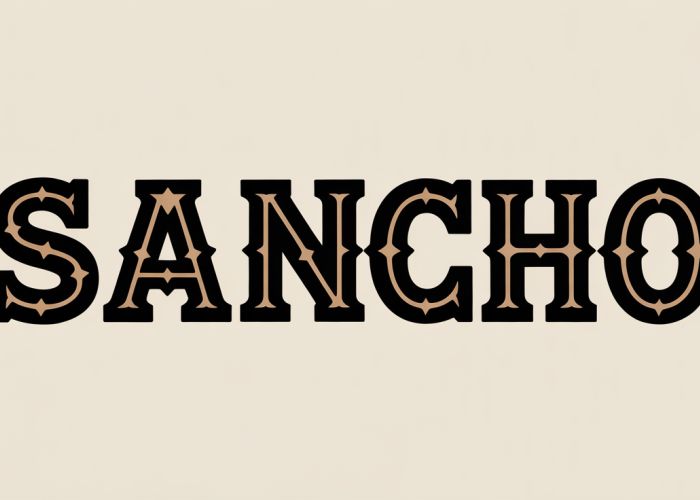The _Royal Spanish Academy (RAE)_, as the preeminent authority on the Spanish language, provides valuable context to understanding etymological nuances. The enduring popularity of Miguel de Cervantes’s Don Quixote significantly contributes to the common usage and recognition of Spanish names. The linguistic field of onomastics studies the origin and meaning of names, a crucial area for discerning the sancho meaning spanish. Furthermore, Spain’s rich cultural heritage and history heavily influence the significance and interpretation of traditional names. This article delves into the depths of **sancho meaning spanish**, exploring its historical roots and cultural relevance.

Deconstructing "Sancho Meaning Spanish: Unlocking the Mystery & Origin!" – A Comprehensive Article Layout
This outline details the ideal article structure for comprehensively exploring the keyword "sancho meaning spanish," ensuring clarity, authority, and engagement.
Introduction: Setting the Stage
- Engaging Hook: Start with a captivating question or a surprising fact related to the name Sancho or its usage, to immediately grab the reader’s attention. For example: "Have you ever wondered about the origins of the name Sancho, and its deep connection to Spanish history and culture?"
- Keyword Integration: Naturally weave the primary keyword "sancho meaning spanish" into the introductory paragraph. This establishes the article’s focus. Example: "This article dives into the ‘sancho meaning spanish’, uncovering its etymological roots and evolution through time."
- Brief Overview of Content: Clearly outline what the reader will learn in the article. This sets expectations and encourages continued reading.
- Etymology of the name Sancho.
- Historical figures named Sancho.
- Cultural significance and common usage.
- Potential variations and related names.
Tracing the Roots: Etymology of "Sancho"
- Origin Language: Emphasize that "Sancho" is a name with Iberian (Spanish and Portuguese) roots, rather than exclusively Spanish.
- Possible Meanings: Present the different theories regarding the origin of the name. Include scholarly opinions and cite sources where possible.
- Theory 1: Derived from a Germanic element (e.g., "Sanctus" meaning holy or sacred).
- Theory 2: Connection to Basque language origins (less common, but worth mentioning if credible sources exist).
- Clearly state which theory is most widely accepted and why.
- Evolution of the Name: Briefly touch upon how the name might have changed over time and across different regions.
Historical Significance: Prominent Figures Named Sancho
- Highlight Key Individuals: Focus on historically significant individuals named Sancho, primarily those with Spanish connections.
- Sancho I of León
- Sancho III of Navarre (Sancho the Great)
- Sancho IV of Castile
- Brief Biographical Sketches: For each figure, provide a concise overview of their life, reign, and key achievements.
- Importance of Their Titles: Mention the significance of their titles (e.g., King of León, King of Navarre) and how it reflects the historical context of the name.
- Relevance to Name Popularity: Discuss how these figures contributed to the name’s popularity and enduring appeal.
Cultural Impact and Usage Today
- Name Popularity: Discuss the current popularity of the name Sancho in Spain and other Spanish-speaking countries. Include relevant statistics or trends, if available.
- Common Usage Scenarios: Explain how the name is typically used:
- As a given name (first name).
- As part of a surname (less common).
- Cultural Connotations: Explore any cultural associations or stereotypes associated with the name Sancho, if any. Be objective and avoid perpetuating harmful stereotypes.
- "Sancho Panza" Analysis: Analyze the impact of Miguel de Cervantes’ character, Sancho Panza, from Don Quixote.
- Positive or negative influence on the name’s perception?
- How has the character been portrayed in different adaptations?
- Did his portrayal solidify the name’s place in popular culture?
Variations and Related Names
- Language Variations: List any variations of the name in other languages, especially those spoken in regions with historical Spanish influence.
- Portuguese: Sancho
- French: Sanche
- Diminutives and Nicknames: Mention common nicknames or diminutive forms of the name Sancho (e.g., San).
- Related Names: Explore names with similar origins or meanings that might be related to Sancho.
-
Table of Variations: Present the information in a clear and organized manner using a table, if appropriate:
Language Variation Notes Spanish Sancho Original form Portuguese Sancho Same spelling as Spanish French Sanche Slightly different spelling and pronunciation
Linguistic Analysis
- Pronunciation: Include a guide to the correct pronunciation of "Sancho" in Spanish, using phonetic transcription if necessary.
- Grammatical Gender: Clearly state that "Sancho" is a masculine name.
- Word Derivations: Discuss any other words in Spanish that might be derived from the same root as "Sancho" (if applicable).
This detailed layout provides a robust structure for an article focusing on the "sancho meaning spanish" keyword, ensuring comprehensive coverage and clarity for the reader.
FAQs: Sancho Meaning Spanish
This section answers common questions about the meaning and origin of the name Sancho.
What does the name Sancho mean in Spanish?
The name Sancho, of Spanish origin, generally means "sanctified" or "holy." It carries connotations of being blessed or consecrated. This understanding of the sancho meaning spanish is widely accepted.
Where does the name Sancho originate?
The name Sancho has Basque origins, spreading through Spain during the Middle Ages. It was a popular name among royalty and nobility, particularly in the kingdoms of Navarre, Castile, and Aragon.
Is Sancho a common name in Spanish-speaking countries today?
While not as common as some other Spanish names, Sancho is still recognized and used in some Spanish-speaking regions. You might encounter it more frequently in older generations or in areas with strong historical ties. Understanding the sancho meaning spanish helps appreciate its heritage.
Are there any famous historical figures named Sancho?
Yes, several Spanish kings and nobles bore the name Sancho. Notable examples include Sancho III of Navarre and Sancho IV of Castile. Their prominence solidified the name’s place in Spanish history and culture, reflecting its sancho meaning spanish of sanctity.
So, hopefully, you’ve now got a better grasp of the whole *sancho meaning spanish* thing! There’s definitely more to this name than meets the eye. Thanks for diving in with me!